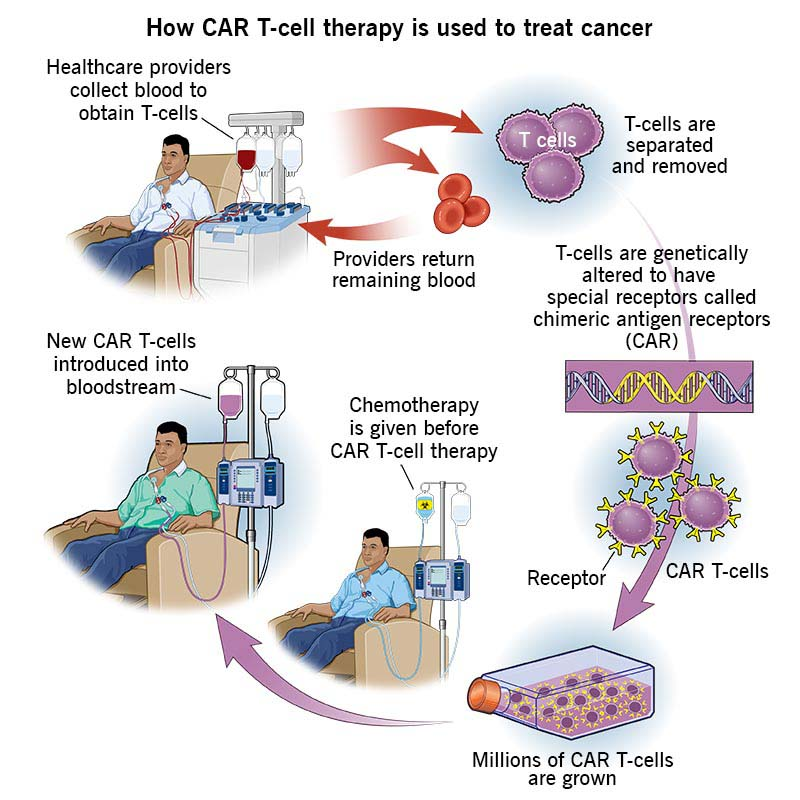Chimeric antigen receptor (CAR) T-cell therapy is a groundbreaking form of immunotherapy designed to treat certain types of blood cancers, including some leukemias and lymphomas. This therapy works by collecting a patient’s own T cells - immune cells responsible for fighting infections—and genetically modifying them in a laboratory to produce special receptors called chimeric antigen receptors (CARs) on their surface. These receptors enable the T cells to better recognize and attack cancer cells.
Once modified, the CAR T cells are multiplied and then infused back into the patient’s bloodstream, where they seek out and destroy cancerous cells more effectively than unmodified T cells. Because CAR T-cell therapy harnesses and enhances the body’s natural immune response, it offers hope for patients who have not responded to conventional treatments or who have experienced a relapse.
For patients seeking advanced treatment options, CAR T-cell Therapy in Nanakramguda, Hyderabad provides access to this innovative and personalized cancer treatment. Healthcare providers in Nanakramguda are equipped to offer CAR T-cell therapy as part of a comprehensive cancer care plan.
This therapy has shown promising results, including complete remission in some cases of blood cancer, and ongoing research continues to expand its applications and improve patient outcomes.

Right now, CAR T-cell therapy is an option to treat some blood cancers when other treatments aren’t effective or the condition comes back. Those blood cancer types include:
An overview of various blood cancers and the role of CAR T-cell therapy in treatment.
To understand how CAR T-cell therapy works, it may help to know more about T cells, which are white blood cells in your immune system. Your immune system monitors your body for intruders, including cancer, by tracking proteins called antigens on the surface of intruder cells.
Your T cells have their own surface proteins called receptors. These receptors can recognize cells that have abnormal antigens. T cells act as a surveillance system for abnormal cells, becoming active when a receptor recognizes an abnormal cell. The activated T cell goes to work, destroying the abnormal cell and activating other parts of your immune system to come help find and destroy abnormal cells.
But your T-cell receptors don’t always detect cancerous cells. Enter CAR T cells, your own T cells that are changed so they recognize a specific antigen on the surface of cancer cells. Scientists change your T cells by adding a lab-made gene for a chimeric antigen receptor. Next, they make the new CAR T cells grow and multiply until there are enough cells to target cancerous cells effectively.
Once in your bloodstream, CAR T-cell receptors detect and destroy cancerous cells. The cells also keep on multiplying so you have a long-term supply of CAR T cells targeting your cancer cells. That long-term supply is why researchers and healthcare providers call CAR T-cell therapy a type of “living drug.”
Yes, there are six CAR T-cell therapies with U.S. Food and Drug Administration (FDA) approval to treat specific kinds of blood cancer:
First, you donate white blood cells through a procedure called leukapheresis. In leukapheresis, a machine draws some of your blood, extracts your white blood cells, and then returns the remaining blood to your body. Typically, your providers will insert a central venous catheter to remove and return your blood.
Next, your white blood cells are quickly transported to the facility where scientists will turn your cells into CAR T cells. This process can take between three and six weeks.
Depending on your situation, you may have chemotherapy or radiation therapy after leukapheresis but before you receive CAR T cells. Your healthcare provider may call this bridging therapy. These treatments manage blood cancer during the time it takes to produce and grow enough CAR T cells to treat your condition.
When it’s time for you to receive your new cells, you’ll undergo lymphodepleting chemotherapy. This treatment keeps your body from rejecting the CAR T cells.
The actual treatment involves receiving CAR T cells via infusion. CAR T-cell infusion takes between five and 30 minutes and is done via an intravenous line (IV). You may need to stay in the hospital during the procedure. The infusion process is similar to a blood transfusion:
This treatment may cause serious side effects, so your provider may recommend that you stay in the hospital immediately after treatment. Depending on your situation, including side effects, you may need to stay in the hospital for seven to 10 days. After that, you should plan to be within driving distance of your treatment center for the first month after treatment. You’ll also need:
The two most common side effects are cytokine release syndrome and neurological issues. Cytokine release syndrome is an inflammatory syndrome that causes symptoms, including:
Neurological issues from CAR T-cell therapy may include:
Other potential side effects are:
CAR T-cell therapy is a newer way to treat some kinds of blood cancer when other treatments aren’t effective or when cancer comes back (recurs). Sometimes, CAR T-cell therapy can cure certain types of blood cancer. Often, it helps people live longer.
A 2020 study tracked children receiving treatment for acute lymphoblastic leukemia. More than 85% of the children had complete remission right after CAR T-cell treatment, and 60% of those children remained free of cancer 12 months after treatment. On the other hand, an analysis of CAR T-cell therapy research concluded that for a significant percentage of people, CAR T-cell therapy wasn’t a cure for their condition.
CAR T-cell therapy side effects can be life-threatening, especially cytokine release syndrome and some neurological issues. Before you leave the hospital, be sure to ask your provider about symptoms that could be signs of serious issues. For example, cytokine release syndrome symptoms that linger, like fever, chills, headache, and nausea, may be reason to call your provider right away or go to the emergency room.
Explore More : Stem Cell Transplant in Nanakramguda, Hyderabad